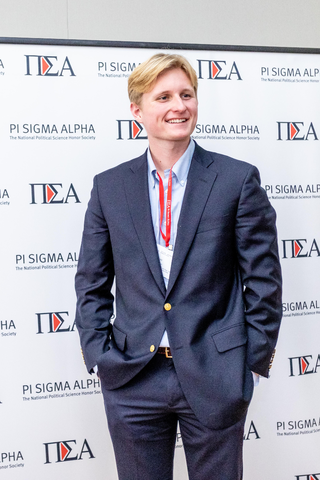Finding Interdisciplinary Connections

During his time at SCU, Wohl studied political science, history, and philosophy, finding different ways to connect these three interests.
By Catherine Joy ’23 and Sarah Stoddard ’23
Rob Wohl ’23 graduated from Santa Clara University this past weekend with a double major in political science and history and a minor in philosophy. He explains that the quarter system at SCU made it possible for him to fit these three different subjects into his schedule over the past four years. “The College of Arts and Sciences faculty established clear connections between each discipline and made my majors and minor feel like individual facets of one coherent whole,” he says.
Over the past year, Wohl completed two senior theses and had the opportunity to present both at different research conferences. The first thesis, about royalist political thought in post-revolutionary France, was presented at Johns Hopkins University in Baltimore, and the second, on Friedrich Nietzsche’s philosophy, was presented at George Washington University in D.C. Wohl’s theses are currently under consideration for publication in the journals of each conference.
Wohl recently received even more recognition for his skills in research and writing. SCU’s 2023 Hoefer Undergraduate Writing Prize, in the category of student-authored essay, was awarded to Wohl for his essay titled "Masking Evil: St. Domingan Émigrés in the Philadelphian Press, 1789-1793," written under the mentorship of Greg Wigmore (History).
Learn more about Wohl’s time at SCU in this Q&A!
Why did you decide to pursue your majors?
I came to Santa Clara as a history major, a decision informed by a wonderful history teacher I had in high school. Santa Clara’s history faculty were knowledgeable and kind, and encouraged me to add other majors so as to compliment my history education. History is inherently interdisciplinary; everything humans have done is technically “history,” so there naturally exists a wide variety of historical subfields (economic history, military history, cultural history, etc.). My political science major and philosophy minor naturally supplemented my history education and vice versa, informing my interest in intellectual history––the historical study of ideas.
Santa Clara’s College of Arts and Sciences is unique in its facilitation of interdisciplinary studies, and I would encourage any student to try and add on another major or minor––every department complements each other.
What’s your favorite class you’ve taken within your major?
My favorite class I’ve taken within my political science major has been Peter Minowitz’s senior seminar on Friedrich Nietzsche’s 1886 book, Beyond Good and Evil. Santa Clara’s political science department has a uniquely robust offering of political philosophy courses, and Professor Minowitz’s seminar was one of the most rewarding intellectual experiences I have had in my life.
The class is structured as a close reading of Beyond Good and Evil, a notoriously complex and esoteric book. Where most philosophy classes lightly cover multiple different philosophers from week to week, Professor Minowitz’s seminar lets students sit with one book for an entire 10-week quarter. Students accordingly develop an extremely deep understanding of Nietzsche’s philosophy.
What advice would you give to other students at SCU?
My primary word of advice is to establish connections with professors! Faculty mentors have been immensely helpful for me as a student. Professors want nothing more than to help undergraduates discover their academic passions. They were once in our shoes and oftentimes pursued academia because of mentors they themselves had as undergraduates!
I personally came to Santa Clara with a nonspecific passion for history. Santa Clara’s faculty nurtured this passion into a narrow research interest in intellectual history, which I am now planning on studying in Scotland next year at the University of Edinburgh. This would not have been possible had the Santa Clara faculty not given me such extensive and personalized academic guidance.